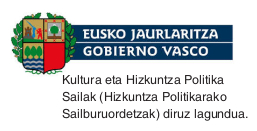Intransitive reflexives and reciprocals in comparison to impersonals and inchoatives
DOI:
https://doi.org/10.26876/uztaro.129.2024.5067Keywords:
Reflexives, Reciprocals, Impersonals, Inchoatives, IntransitivityAbstract
In this paper we explore intransitive reflexive and reciprocal constructions and compare them to impersonals and inchoatives. All these constructions have the same surface morphology in Basque: their sole argument is marked with absolutive case and agreement and the auxiliary selected is izan ‘be’. Nevertheless, they have different syntactic distribution. In this paper, we apply the tests that are used to characterize impersonals and inchoatives —and some others— to intransitive reflexives and reciprocals. Some of these tests suggest that intransitive reflexives and reciprocals have an external argument, patterning in this respect with impersonals and not with inchoatives. Nevertheless, in other contexts, reflexives and reciprocals depart from impersonals and behave like inchoatives. For instance, the overt absolutive argument is not subject to the person restriction observed in impersonal constructions. Finally, unlike in impersonals and inchoatives, the overt absolutive argument of reflexives and reciprocals behaves in certain tests like an external argument.
Downloads
References
Albizu, Pablo (2001). Sobre la distribución sintáctica de las formas finitas del verbo vasco: condicionamiento léxico y sintáctico. ASJUren Gehigarriak, 35(1), 65-106. https://doi.org/10.1387/asju.8817
Alday, Gontzal (2006). The semantic (i.e. split-intransitive) case-marking system of Western Basque. In Beatriz Fernández eta Itziar Laka (argtz.), Andolin gogoan: Essays in ho-nour of Professor Eguzkitza (117-138. or.). UPV/EHU.
Alday, Gontzal (2009). Is Basque morphologically ergative?: Western Basque vs. Eastern Basque. Studies in Language, 33(4), 783-831.
Alexiadou, Artemis eta Anagnostopoulou, Elena (2008). Structuring participles. In Charles Bond Chang eta Hannah J. Haynie (argtz.), Proceedings of the WCCFL 26 (33-41. or.). Cascadilla Press.
Alexiadou, Artemis; Anagnastopoulou, Elena eta Everaert, Martin (2004). Introduction. In Artemis Alexiadou, Elena Anagnastopoulou eta Martin Everaert (argtz.), The unaccu-sativity puzzle. Explorations of the syntax-lexicon interface (1-21. or.). Oxford Universi-ty Press. https://doi.org/10.1093/acprof:oso/9780199257652.003.0001
Anagnostopoulou, Elena (2003). Participles and Voice. In Artemis Alexiadou, Monika Rathert eta Arnim von Stechow (argtz.), Perfect explorations (1-36. or.). Mouton de Gruyter. https://doi.org/10.1515/9783110902358.1
Aranovich, Raul (2007). Split auxiliary systems. John Benjamins. https://doi.org/10.1075/tsl.69
Artiagoitia, Xabier (2003). Reciprocal and reflexive constructions. In José Ignacio Hualde eta Jon Ortiz de Urbina (argtz.), A grammar of Basque (607-632. or.). de Gruyter. https://doi.org/10.1515/9783110895285.607
Bahrt, Nicklas (2021). Voice syncretism. Language Science Press. DOI: 10.5281/zenodo.5948872
Belletti, Adriana eta Rizzi, Luigi (1988). Psych verbs and θ-theory. NLLT, 6, 291-352. https://www.jstor.org/stable/4047649
Berro, Ane (2010). Unergative predicates in Basque varieties: consequences for the ergative case assignment. In Pello Salaburu, Patxi Goenaga eta Ibon Sarasola (argtz.), Sareko Euskal Gramatika. Basque Grammar Online (SEG). DEA research work. University of the Basque Country (UPV/EHU). https://www.ehu.eus/seg/_media/morf/5/12/2/1/sak/aneberrotesia.pdf
Berro, Ane (2012). Three levels of root insertion in Basque intransitive verbs. In Ernestina Carrilho eta Beatriz Fernández (argtz.), Journal of Portuguese Linguistics. Special Issue, 11(1), Ediçoes Colibrí - Universidade de Lisboa, 7-22. https://basqueandbeyond.ehu.eus/pdf/JPL_Berro_final.pdf
Berro, Ane; Oihartzabal, Beñat eta Fernández, Beatriz (2018). Inkoatibo/arazle alternantzia euskaraz eratortzen. In Beatriz Fernández eta Ane Berro (argtz.), Euskaratik giza hiz-kuntzara. Jon Ortiz de Urbinari gorazarre. Fontes Linguae Vasconum, 126, 99-122. Nafarroako Gobernua. https://doi.org/10.35462/FLV126.4
Berro, Ane eta Fernández, Beatriz (2019). (Euskal) Bozak: erdikoak, inkoatiboak eta arazleak. In Itziar Laka (argtz.), Hitzak sarean. Pello Salabururi esker onez (39-50. or.). UPV/EHU.
Berro, Ane; Odria, Ane eta Fernández, Beatriz (2022). Person matters in impersonality. Syn-tax, 25(2), 147-187. https://doi.org/10.1111/synt.12230
Berro, Ane; Odria, Ane eta Fernández, Beatriz (2023). Indirect causatives in Basque: the syn-tax of implicit causers and causees [eskuizkribua]. Deustuko Unibertsitatea eta UPV/EHU.
Bhatt, Rajesh eta Pancheva, Roumyana (2005). Implicit arguments. In Martin Everaert eta Henk Van Riemsdijk (argtz.), The Blackwell Companion to Syntax (558-588. or.). 3. Blackwell Publishing.
Bilbao, Kristina (2022a). Euskarazko elkarkari iragangaitzak: lexikoak ala sintaktikoak? (ez baita gauza bera ikusi gara eta ezkondu gara). Gradu Amaierako Lana. UPV/EHU.
Bilbao, Kristina (2022b). Euskarazko elkarkari iragangaitzak: lexikoak ala sintaktikoak? Fontes Linguae Vasconum, 134, 337-373. https://doi.org/10.35462/flv134.3
Bilbao, Kristina; Berro, Ane eta Fernández, Beatriz (2022). Inkoatibo/arazleak, bihurkari eta elkarkariak eta beste (alegiazko solasaldiak egitura iragangaiztuez). In Alexander Iribar eta Irene Barberia (argtz.), Papers on Basque Linguistics in Honor of Jon Andoni Fran-co Elorza (127-146. or.). Deustuko Unibertsitatea.
Blevins, James (2003). Passives and impersonals. Journal of Linguistics, 39(3), 473-520. https://www.jstor.org/stable/4176832
Bruyn, Bert le (2014). Inalienable possession. The status of the article. In Ana Aguilar-Guevara, Bert Le Bruyn eta Joost Zwarts, Weak referentiality (311-334. or.). John Ben-jamins. https://doi.org/10.1075/la.219.13bru
Burzio, Luigi (1981). Intransitive verbs and Italian auxiliaries. PhD Thesis. Massachusetts Ins-titute of Technology, Dept. of Linguistics and Philosophy. http://dspace.mit.edu/handle/1721.1/15849
Burzio, Luigi (1986). Italian Syntax. A Government-Binding Approach, Studies in Natural Language and Linguistic Theory (1), Springer. https://doi.org/10.1007/978-94-009-4522-7
Chomsky, Noam (1981). Lectures on Government and Binding: The Pisa lectures. Foris.
Collins, Chris (2005). A smuggling approach to the passive in English. Syntax, 8, 81-120. https://doi.org/10.1111/j.1467-9612.2005.00076.x
Dixon, Robert (1991). A new approach to English grammar, on semantic principles. Oxford University Press. https://doi.org/10.1017/S0022226700000104
Etxeberria, Urtzi (2010). -A, -ak eta -(r)ik euskal hizkeretan zehar. In Beatriz Fernández, Pablo Albizu eta Ricardo Etxepare (argtz.), Euskara eta euskarak: aldakortasun sintaktikoa aztergai (65-83. or.). ASJUren Gehigarriak LII.
Etxeberria, Urtzi (2014). Basque nominal: from a system with bare nouns to a system without. In Ana Aguilar-Guevara, Bert Le Bruyn eta Joost Zwarts (argtz.), Weak referentiality (335-364. or.). John Benjamins. https://doi.org/10.1075/la.219.14etx
Etxeberria, Urtzi (2021). The partitive marker in Basque, and its relation to bare nouns and the definite article. In Petra Sleeman eta Giuliana Giusti (argtz.), Partitive determiners, partitive pronouns and partitive case (319-356. or.). De Gruyter. https://doi.org/10.1515/9783110732221-010
Etxepare, Ricardo (2003a). Reflexives and reciprocals. In José Ignacio Hualde eta Jon Ortiz de Urbina (argtz.), A Grammar of Basque (380-385. or.). de Gruyter. https://doi.org/10.1515/9783110895285.363
Etxepare, Ricardo (2003b): Negation. In José Ignacio Hualde eta Jon Ortiz de Urbina (argtz.), A Grammar of Basque (387-421. or.). de Gruyter. https://doi.org/10.1515/9783110895285.516
Euskaltzaindia (1985). Euskal Gramatika: Lehen Urratsak (EGLU) I. Euskaltzaindia [Berrar-gitalpena: Euskaltzaindia 1991].
Euskaltzaindia (1987). Euskal Gramatika: Lehen Urratsak (EGLU) II. Euskaltzaindia [Be-rrargitalpena: Euskaltzaindia 1997].
Euskaltzaindia (2002). Euskal Gramatika Laburra: perpaus bakuna (EGLA). Euskaltzaindia.
Evseeva, Natalia eta Salaberri, Iker (2018). Grammaticalization of nouns meaning «head» into reflexive markers: a cross-linguistic study. Linguistic Typology, 22(3), 385-435. https://doi.org/10.1515/lingty-2018-0014
Fernández, Beatriz (1997). Egiturazko kasuen erkaketa euskaraz. UPV/EHU. https://basqueandbeyond.ehu.eus/pdf/Beatriz_Fernandez_1997.pdf
Fernández, Beatriz eta Berro, Ane (2021). Basque impersonals in comparison. Linguistics, 60(4), 1.039-1.101. https://doi.org/10.1515/ling-2020-0057
Fernández, Beatriz; Berro, Ane eta Pérez Saldanya, Manuel (onartua). Connexions bascocata-lanes: les impersonals de subjecte suprimit. Caplletra.
Guéron, Jaqueline (2006). Inalienable possession. In Martin Everaert eta Henk van Riemsdijk (argtz.), The Blackwell companion to syntax (589-638. or.). Blackwell. https://doi.org/10.1002/9781118358733.wbsyncom045
Kuno, Susumo eta Takami, Ken-ichi (2004). Functional constraints in grammar: On the uner-gative-unaccusative distinction [Constructional Approaches to Lenguage 1]. John Ben-jamins. https://doi.org/10.1075/cal.1
Landau, Idan (2010). The explicit syntax of implicit arguments. Linguistic Inquiry 41(3), 357-388. https://www.jstor.org/stable/40926385
Legendre, Géraldine (2007). On the typology of auxiliary selection. Lingua, 117, 1.522-1.540. https://doi.org/10.1016/j.lingua.2006.06.005
Levin, Beth (1983). Unaccusative Verbs in Basque. North East Linguistic Society, 13(1), 129-144. https://scholarworks.umass.edu/nels/vol13/iss1/12/
Levin, Beth eta Rappaport Hovav, Malka (1995). Unaccusativity: At the syntax-lexical seman-tics interface. The MIT Press. https://hdl.handle.net/2027/heb08443.0001.001
Levin, Beth eta Rappaport Hovav, Malka (2005). Argument realization. Cambridge University Press. https://doi.org/10.1017/CBO9780511610479
MacDonald, Jonathan (2017). An Implicit Projected Argument in Spanish Impersonal- and Passive-Se Constructions. Syntax, 20(4), 353-383. https://doi.org/10.1111/synt.12146
McFadden, Thomas (2007). Auxiliary selection. Language and Linguistic Compass, 1(6), 674-708. https://doi.org/10.1111/j.1749-818X.2007.00034.x
Mounole, Céline (2014 [2018] ). Le verbe basque ancien: étude philologique et diachronique, ASJU, 48. UPV/EHU. https://ojs.ehu.eus/index.php/ASJU/article/view/24136/21403
Odria, Ane; Berro, Ane eta Fernández, Beatriz (2022). Pertsona murriztapenak ditu inpertso-naltasunak: euskararen kasua. Fontes Linguae Vasconum, 133, 191-219. https://doi.org/10.35462/flv133.7
Oihartzabal, Beñat (1992). Structural case and inherent case marking: Ergaccusativity in Bas-que. Supplements of the International Journal of Basque Linguistics and Philology, ASJU, 27, 309-342. Gipuzkoako Foru Aldundia. https://doi.org/10.1387/asju.9402
Oihartzabal, Beñat (2003a). Tense, aspect and mood. In José Ignacio Hualde eta Jon Ortiz de Urbina (argtz.), A Grammar of Basque (249-284. or.). de Gruyter. https://doi.org/10.1515/9783110895285.195
Oihartzabal, Beñat (2003b). Relatives. In José Ignacio Hualde eta Jon Ortiz de Urbina (argtz.), A Grammar of Basque (762-823. or.). de Gruyter. https://doi.org/10.1515/9783110895285.632
Oikonomou, Despina eta Alexiadou, Artemis (2022). Voice Syncretism cross-linguistically: The View from Minimalism. Philosophies, 7, 19. https://doi.org/10.3390/philosophies7010019
Ormazabal, Javier (2008). Kausatibo aldizkatzeak euskaraz eta inguruko hizkuntzetan. In Xa-bier Artiagoitia eta Joseba A. Lakarra (argtz.), Gramatika jaietan Patxi Goenagaren omenez [ASJUren Gehigarriak, 51] (643-663. or.). https://doi.org/10.1387/asju.9833
Ormazabal, Javier eta Romero, Juan (2019). The formal properties of non paradigmatic SE. Borealis, 8, 55-84. https://doi.org/10.7557/1.8.1.4704
Ortiz de Urbina, Jon (1988). Interferentzia sintaktiko berezi batez. In II. Euskal Mundu-Biltzarra, Euskara Biltzarra. I. atala: hizkuntz deskribapena, Eusko Jaurlaritza.
Ortiz de Urbina, Jon (1989). Parameters in the grammar of Basque. Foris.
Ortiz de Urbina, Jon (2003). Impersonal clauses. In José Ignacio Hualde eta Jon Ortiz de Ur-bina (argtz.), A grammar of Basque (572-591. or.). de Gruyter. https://doi.org/10.1515/9783110895285.572
Perlmutter, David (1978). Impersonal passives and the unaccusative hypothesis. Proceedings of the Fourth Annual Meeting of the Berkeley Linguistics Society, 4, 157-89. https://doi.org/10.3765/bls.v4i0.2198
Perlmutter, David (1989). Multiattachment and the unaccusative hypothesis: the perfect auxi-liary in Italian. Probus, 1, 63-119. https://doi.org/10.1515/prbs.1989.1.1.63
Pineda, Anna eta Berro, Ane (2020). Hybrid intransitives in Basque. Glossa: a journal of ge-neral linguistics, 5(1), 22. https://doi.org/10.5334/gjgl.824
Ramchand, Gillian (2004). First Phase syntax. Draft of the Workshop on Tense, Aspect and Modality at GLOW. Thessaloniki.
Ramchand, Gillian (2008). Verb Meaning and the Lexicon: A First Phase Syntax. Cambridge University Press.
Rebuschi, Georges (1988). Defining the three binding domains in Basque. ASJU, 27(1), 232-242. https://doi.org/10.1387/asju.7965
Reinhart, Tania eta Siloni, Tal (2004). Against the Unaccusative Analysis of Reflexives. In Artemis Alexiadou, Elena Anagnostopoulou eta Martin Everaert (artz.), The Unaccu-sativity Puzzle: Explorations of the Syntax-Lexicon Interface (159-180. or.). Oxford University Press. https://doi.org/10.1093/acprof:oso/9780199257652.003.0007
Reinhart, Tania eta Siloni, Tal (2005). The lexicon-syntax parameter: reflexivization and other arity operations. Linguistic Inquiry, 36, 389-436. https://doi.org/10.1162/0024389054396881
Rezac, Milan (2009). Person restrictions in Basque intransitives. Lapurdum, 13, 305-322. https://doi.org/10.4000/lapurdum.2172
Rezac, Milan (2016). «Gaps and stopgaps in Basque verb finite agreement. In Beatriz Fernández eta Jon Ortiz de Urbina (argtz.), Microparameters in the grammar of Bas-que (139-192. or.). John Benjamins.
Rijk, Rudolf P.G. de (1972). Partitive assignment in Basque. ASJU, 6, 130-173. https://ojs.ehu.eus/index.php/ASJU/article/view/7363/6575
Rijk, Rudolf P.G. de (1996). On the origin of the partitive determiner. ASJU, 30, 435-447. https://ojs.ehu.eus/index.php/ASJU/article/view/8635/7803
Rijk, Rudolf P.G. de (2008). Standard Basque: A progressive grammar. The MIT Press. https://doi.org/10.7551/mitpress/7444.001.0001
Rodet, Ana (1992). Construccions amb lectura arbitrària en basc. ASJU, 26, 145-179. https://ojs.ehu.eus/index.php/ASJU/article/view/8287/7449
Salaberri, Iker (2019). Euskarazko bihurkarien historiaz: hizkuntza ukipena eta errepikapen gramatikalizazioa. Euskera, 64(2, 1), 651-682. https://www.euskaltzaindia.eus/dok/euskera/82705.pdf
Salaberri, Iker (2020). Grammaticalization of reflexivity in Basque: a corpus-based diachronic and typological analysis. Journal of Historical Linguistics, 10(1), 1-41. https://doi.org/10.1075/jhl.18036.sal
Salaburu, Pello (1986a). Uztardura Teoria. In Patxi Goenaga (argtz.), Euskal sintaxiaren zen-bait arazo (59-94. or.). UPV/EHU.
Salaburu, Pello (1986b). La teoría del ligamiento en la lengua vasca. ASJU, 20(2), 325-341. https://ojs.ehu.eus/index.php/ASJU/article/view/7773/6965
Salaburu, Pello (1992). Euskara, hizkuntza ergatiboa ote da? In Jean Haritschelhar (argtz.), Luis Villasanteri omenaldia (417-433. or.). Euskaltzaindia. https://www.euskaltzaindia.eus/dok/ikerbilduma/673.pdf
Sarasola, Ibon (2008-2023). Egungo Euskararen Hiztegia. UPV/EHU. https://www.ehu.eus/eeh/
Siloni, Tal (2012). Reciprocal verbs and symmetry. Natural Language and Linguistic Theory, 30(1), 261-320. https://doi.org/10.1007/s11049-011-9144-2
Urrutia, Aritz; Goitia, Beñat eta Artiagoitia, Xabier (2015). Zenbait ohar bata bestea anafora elkarkariaren inguruan. In Mari Jose Ezeizabarrena eta Ricardo Gómez (argtz.) Eride-nen du zerzaz kontenta: sailkideen omenaldia Henrike Knörr irakasleari (1947-2008) (617-643. or.). UPV/EHU.
Zribi-Hertz, Anne (1982). La construction «se-moyen» du français et son statut dans le trian-gle: moyen-passif-réfléchi. Lingvisticae Investigationes, 6(2), 345-401. https://doi.org/10.1075/li.6.2.05zri
Zúñiga, Fernando eta Kittilä, Seppo (2019). Grammatical voice. Cambridge University Press. https://doi.org/10.1017/9781316671399
Zúñiga, Fernando eta Fernández, Beatriz (2021). Basque antipassives revisited. In Katarzyna Janic eta Alena Witzlack-Makarevich (argtz.), Antipassive. Tipology, diachrony, and related constructions (621-640. or.) [Typological Studies in Language 130]. John Ben-jamins. https://doi.org/10.1075/tsl.130.19zun
License
Copyright (c) 2024 Kristina Bilbao Hernandez, Ane Berro, Beatriz Fernandez Fernandez

This work is licensed under a Creative Commons Attribution-NonCommercial-ShareAlike 4.0 International License.




















